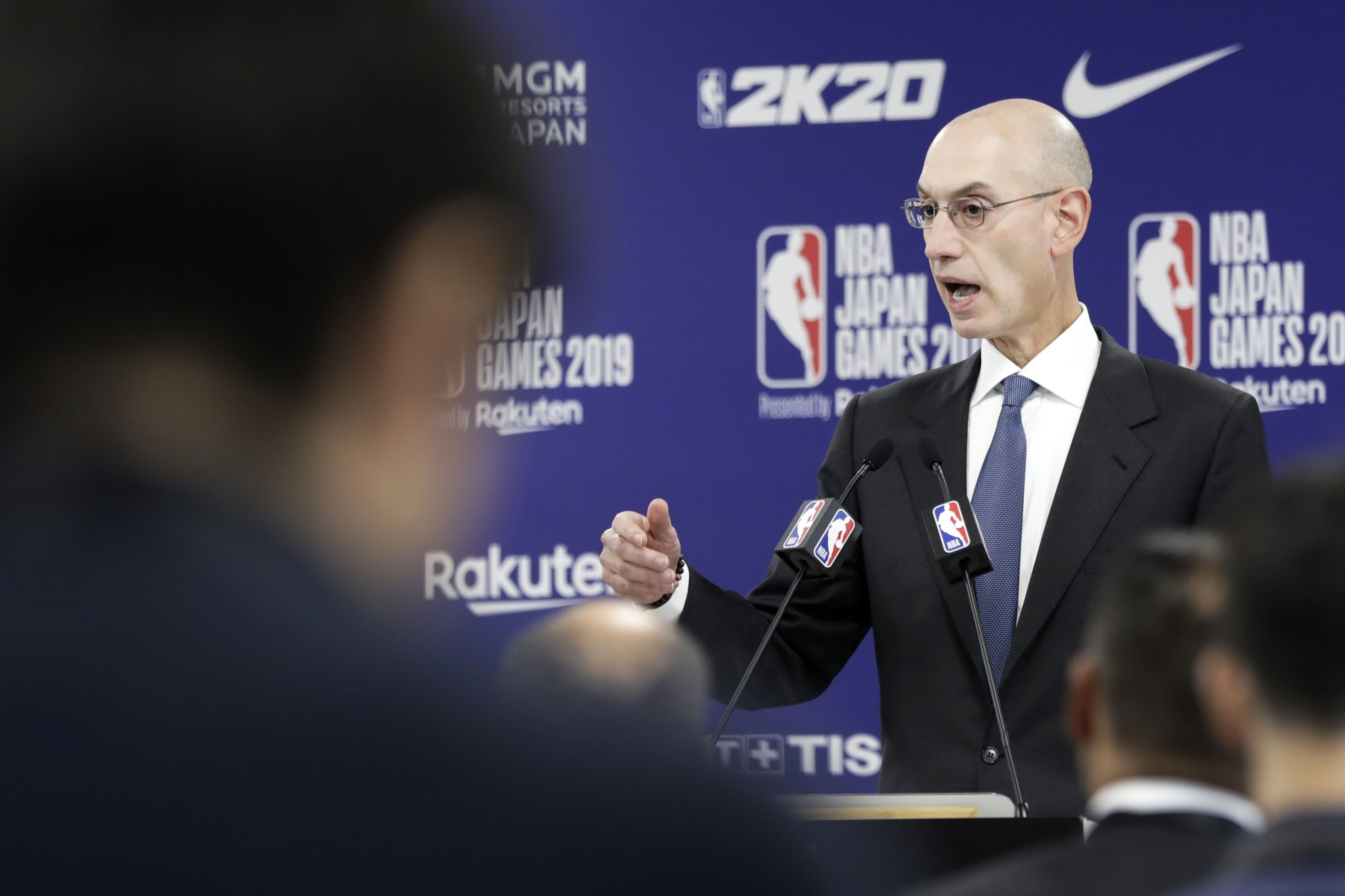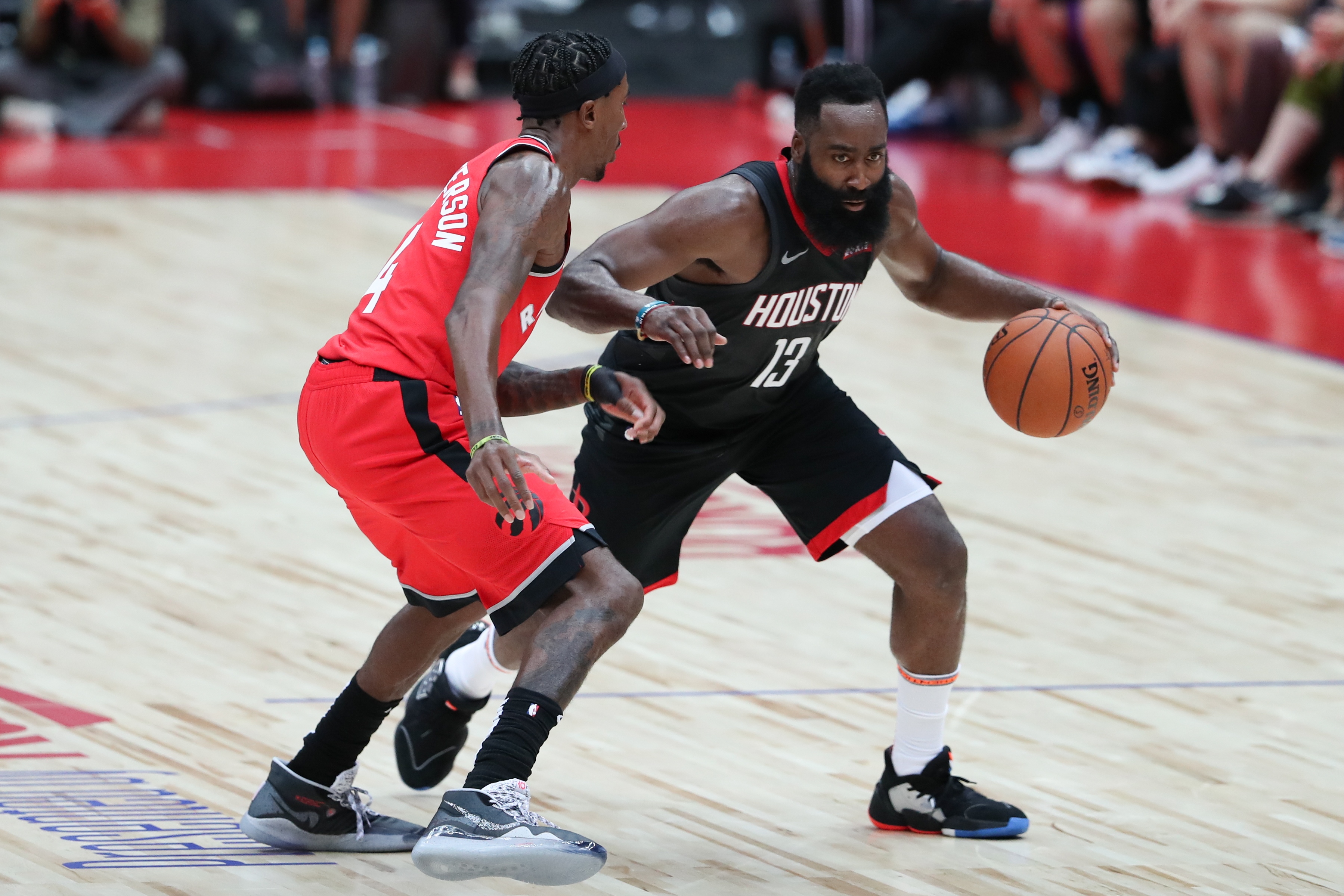Oct 8, 2019
NBA loses more sponsors as China flexes economic muscle
, Bloomberg News
NBA boss headed to China in wake of pro-Hong Kong tweet furor
The National Basketball Association lost almost all of its major Chinese sponsors in the country, the league’s biggest market outside the U.S., as the government flexes its economic muscle after a tweet backing Hong Kong’s protesters triggered a backlash.
A local joint venture of Nissan Motor Co. was the latest to distance itself from the U.S. league, joining China’s largest sportswear maker, the second-biggest dairy firm and a smartphone brand who all said they were pulling out. State television CCTV and tech giant Tencent Holdings Ltd. said Tuesday they won’t show NBA’s pre-season games.
In the latest China controversy involving the basketball organization, Beijing is resorting to a time-tested strategy of targeting businesses it deems to challenge its political interests -- especially those questioning its sovereignty over certain territories. The furor, triggered by last week’s tweet by an official with the Houston Rockets, has imperiled the NBA in a multibillion-dollar market.
“Beijing takes a zero-tolerance attitude to any perceived foreign interference in its internal affairs,” said Hugo Brennan, principal Asia analyst at global risk consultancy Verisk Maplecroft. “This explains why it is adopting such a hard-line stance.”
The fracas has cast a shadow on what was supposed to be a key week for the NBA in China, with two top teams scheduled to play exhibition matches. The Brooklyn Nets -- recently bought by Alibaba co-founder Joe Tsai -- and the Los Angeles Lakers are set to clash in Shanghai on Thursday, and on Oct. 12 in Shenzhen, just across the border from Hong Kong.
The row has also raised doubts if the matches will indeed proceed to plan. Both the teams, already in Shanghai, were due to speak to the media on Wednesday but the press conferences, scheduled to start at 4:30 p.m. local time, were delayed with no further notice.
China has become increasingly sensitive as challenges mount on various fronts. A trade war is exacerbating a slowdown in its US$13.6 trillion economy, while pro-democracy protests in Hong Kong are raising questions about its ability to control the semi-autonomous territory. That made the now-deleted tweet by Daryl Morey, general manager of Houston Rockets, particularly inflammatory to Beijing.
Dongfeng Motor Co., Nissan’s joint venture, halted its cooperation with the NBA, while the Mengniu Group, which owns a dairy company and is a long-time NBA marketing partner, said it “resolutely opposes all words and deeds that challenge China’s national sovereignty and endanger China’s social stability.” Anta Sports Products Ltd., a rising sportswear and sneaker firm that signs NBA stars as brand ambassadors, said Morey’s tweet was “wrong.”
Smartphone maker Vivo said it was pulling out, while Master Kong, a maker of instant noodles and beverages, said it ended all NBA-linked marketing activities.
Luckin Coffee Inc., a local rival to Starbucks Corp., also suspended all cooperation with the NBA’s local events. Ctrip.com International, an online travel agent, said on its Weibo account that it was removing all tickets and products related to the NBA from its website.

A “fan night” planned for Wednesday evening, featuring NBA players and Chinese pop stars, was canceled. The local celebrities had decided to pull out of the event earlier this week. Workers were seen stripping a giant NBA banner in a mall in downtown Shanghai, while state-run CCTV said the league should apologize to Chinese fans and withdraw its comments. Some users demanded refunds from Tencent for their NBA subscriptions after the blackout of the preseason games.
The backlash has intensified after NBA Commissioner Adam Silver defended Morey’s right to free speech. Silver refused to apologize and said the NBA doesn’t dictate what people can or can’t say, sparking further anger in a nation that restricts free speech. China’s Communist Party-backed Global Times fired back in a tweet saying “free speech is never free.”
The NBA’s defiance shows the league is willing to pay the price for upholding what Silver called “values of equality, respect and freedom of expression” in its most promising market. Tencent, which holds local digital broadcast rights for NBA games in a five-year deal worth a reported $1.5 billion, said 490 million users watched one or more games on its platforms in the 2018-19 season, triple the number from four years ago.
The league’s position also stands in stark contrast to brands from Versace to Calvin Klein that were forced by an army of Chinese internet users to apologize this year for wrongly labeling Hong Kong as a country, and not as a Chinese city. Cathay Pacific Airways Ltd. has come under intense pressure to crack down on its employees after some workers participated in the Hong Kong marches, leading to the exit of its two top executives.
The NBA’s woes in China also revive memories of the wrath faced a few years ago by brands from Hyundai Motor Co. to Amorepacific Corp., which saw their sales plunge from a boycott. K-pop performances were canceled and retail conglomerate Lotte was harassed by officials after South Korea allowed the deployment of a U.S. missile defense system.
‘Love China’
In the U.S., the reaction has been mixed. James Harden, the most-valuable player for 2018 who plays for Houston Rockets, a team made popular in China by homegrown star Yao Ming, apologized and said “we love China.” Standing next to All-Star teammate Russell Westbrook, he added, “For both of us individually, we go there once or twice a year. They show us the most important love.”

Yet some U.S. lawmakers have blasted the NBA for kowtowing to China. The NBA had earlier said in a separate Chinese statement that the league was “deeply disappointed” with Morey’s “inappropriate” comment.
“What you do and say represents America to the world,” Senator Josh Hawley wrote in a letter to Silver, the NBA commissioner. “And for an American organization to help the most brutal of regimes silence dissent in pursuit of profit is appalling.”
--With assistance from Zheping Huang, Edwin Chan, Tian Ying, Allen Wan and Adrian Wong.








